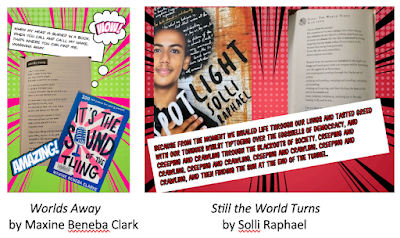Engaging students in recreational reading is crucial to build literacy capabilities. This week, Michelle Davies outlines a book club that is based on free choice and student driven discussions to explore personal and group interests.
The initial aim of the book club program was not only to encourage recreational reading, to share reading experiences, and support each other as readers but also to drive library user engagement. It is evident that library usage declines in this age group, especially in the absence of regular library classes.
Each book club is scheduled to run over four weeks, my role during this time is to supervise discussions, manage activities, and deliver “book talks” at each session. The first session focuses on strategies for selecting books to inform book choice. Students then agree on a book to read independently over the following four weeks, with discussions taking place in the final week. Sessions in-between focus on complimentary literacy and library-based activities that intend to foster relationships, and connections and expose students to varying formats and genres.
Last term students especially enjoyed reading books with an environmental message and making connections with place and community.
Books selected for Term One 2024
This term the focus of student selection highlighted non-fiction titles, and thus became the over-arching concept of the subsequent four weeks. For the book club book, the students chose to read You Don’t Know What War Is by Yeva Skalietska. A diarised account of a 12-year-old Ukrainian girl who, along with her grandmother, suffers the ravages of war due to the invasion of Russia. The story unfolds as they flee their hometown of Kharkiv to seek refuge in Europe and then find safety in Ireland.
Themes initiated from the shared discussion centred around the effects of war, the impact that has on daily lives, and the eventual displacement of people.
Students reflected on their connection to the author with regard to their corresponding ages, and the recognition of the development of Yevs’s emotional strength as she faced new challenges each day.
They also liked the structure of the book. The integration of Yeva’s compelling personal narrative with photographs and extracts of text messages between herself and her school friends added authenticity and enhanced understanding.
To align with the non-fiction concept, a student recommended that each reader select and borrow a non-fiction title from the library based on themes chosen by the group. The objective was to read and explore the book during the week, and then share an intriguing fact at the following book club session.
Themes: World War Two and Economics
During the subsequent session, each student shared their information of interest and was then tasked with creating a statement that would connect the two different themes of World War Two and economics. Their final premise was that the global economy is significantly affected by war due to fuel and food shortages.
Engaging in poetry by using technology
For this session, a variety of poetry books were spread out on the table for the group to discover. Each student selected a title to borrow and returned the following week with a poem that resonated with them. They were encouraged to think about the most important line, what words stood out to them, and how the poem made them think or feel. The students utilised the Book Creator application to make a book snap of their poem and then highlighted their favourite line or stanza, thus creating a personalised image to share with their peers.
As the book clubs have grown, so has the engagement with reading and the development of relationships between students and library staff. In addition, they have provided much more by supporting students as they build their reader identities and allowing them the opportunity to form social connections with their peers, at the same time offering a safe and inclusive space to experiment with alternate ideas, thinking in their discussions, and develop their autonomy.
Michelle Davies
The Hutchins School

















